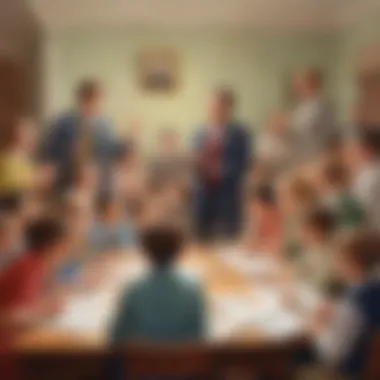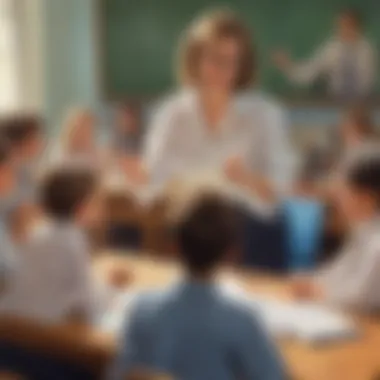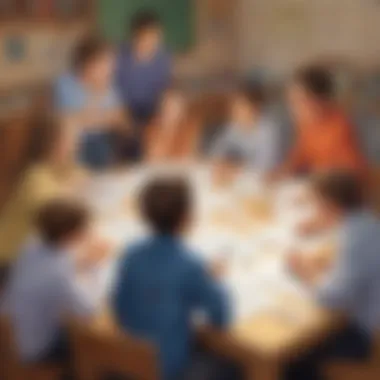The Art of Class Debate: Enhancing Critical Skills


Intro
Class debates serve as a compelling tool in modern education. They cultivate essential skills in children, notably critical thinking and effective communication. Engaging in debates encourages young learners to consider diverse viewpoints, articulate their ideas clearly, and develop a strong sense of persuasion. This article provides an insightful exploration of the mechanics of class debates, the role of educators and caregivers, and practical methods for integrating these discussions into everyday learning.
Interactive Learning Games
Interactive learning games can complement the skills developed in class debates. These games create an atmosphere where children can practice thinking on their feet and articulating responses quickly.
- Popular Games
Discussion-centric games like "Debate Club" or "Fact or Fiction" allow students to analyze statements critically. They can mirror the structure of formal debates while making the process enjoyable. - Description of top educational games
Educational games designed for groups are particularly effective. For instance, games that require students to form arguments for or against specific statements not only get them engaged but also enhance their ability to think critically. - Benefits of playing educational games for kids' cognitive development
These games improve cognitive functions, including memory retention and problem-solving skills. Young learners sharpen these skills while interacting with peers. Such collaborative effort fosters a sense of community and teamwork. - Game Reviews
Analyzing selected educational games can provide valuable insights. Games like "Argument Wars," which pits players against each other in crafting arguments, help hone essential debate skills while making learning fun. - In-depth reviews of selected educational games
A detailed look at "Argument Wars" reveals its effectiveness in enhancing students' understanding of arguments and counterarguments. Players receive immediate feedback, fostering a growth mindset. - Comparison of gameplay and learning outcomes
Comparing various games like "Say Anything" and "Debate Challenge" shows how each game varies in engagement level and learning outcomes. Some emphasize quick-thinking, while others focus on comprehensiveness in argumentation.
Educational Topics
Effective debates often emerge from well-researched topics. Curating a list of educational topics can simplify this task.
- Compilation of articles covering various subjects like math, science, languages, etc.
Topics such as climate change, social justice, or technological advances stimulate rich debates. These subjects engage young minds and help them connect their learning to real-world scenarios. - Importance of interdisciplinary learning for holistic development
Interdisciplinary topics enrich debates and integrate different subject matter. This approach supports students in seeing the connections between various fields of study.
Tips and Tricks
For parents and educators, enhancing children's debate skills can be achieved with simple strategies.
- Practical tips for parents and educators to enhance children's learning journey
Encourage regular practice by attending local debate clubs or organizing family debate nights. This allows children to express their thoughts and feel comfortable in a discussion setting. - Strategies for making learning fun and engaging
Integrating technology can make debates more interactive. Utilizing platforms like Zoom or Discord allows for virtual debates, engaging children in a dynamic way.
Creative DIY Projects
Creating DIY projects that tie in with debate topics can further enrich the educational experience.
Step-by-Step Guides
Hands-on projects where children create visual aids for their arguments can enhance understanding.
- Detailed instructions for engaging DIY projects that promote creativity
For example, a project could involve making posters about a debate topic. This encourages research and aids in visual learning. - Benefits of hands-on activities for children's cognitive and motor skills
Engaging in these productive tasks boosts creativity, fine motor skills, and information retention.
Craft Ideas
Craft-making also enriches the debate experience.
- Collection of creative craft ideas using simple household items
Creating props or models related to debate topics can help children express complex ideas visually. - Importance of artistic expression in children's development
Crafting fosters creativity and allows for personal expression, vital for interpersonal communication.
The ability to debate effectively is not just an academic skill; it is crucial for self-expression and understanding diverse perspectives.
Understanding Class Debates
Class debates serve as a critical platform for fostering essential skills among young learners. They not only enhance communication skills but also nurture critical thinking, allowing students to engage deeply with content and perspectives. Understanding the mechanics of class debates means grasping their significance in education today.
The Purpose of Class Debates
The primary purpose of class debates is to stimulate intellectual engagement. Students learn to articulate their thoughts and defend their viewpoints with evidence. This process develops speaking and listening skills, essential components of effective communication. Moreover, debates encourage students to see topics from multiple perspectives.
By participating in debates, learners gain experience in public speaking. They practice organizing their thoughts logically and presenting them coherently. This helps them to build confidence when expressing opinions, a skill that is crucial in personal and professional contexts. In addition, debates foster respectful dialogue. Students learn to appreciate opposing views, cultivating an environment of collaboration rather than confrontation. In essence, the purpose of class debates transcends mere competition; it is about learning to engage thoughtfully with ideas.
Role of Debating in Education
Debating plays a multifaceted role in education. As an educational tool, it facilitates the development of various competencies. First, it enhances critical thinking. Students must analyze information, assess its validity, and decide how to use it in their arguments. This practice sharpens their ability to think logically.
Second, debating nurtures research skills. Before entering a debate, students need to gather data, allowing them to understand the topic comprehensively. This process teaches them how to sift through information critically, a vital skill in the digital age, where information is abundant but may not always be reliable.
In addition to these cognitive benefits, class debates promote emotional intelligence. Young learners navigate the debates’ ups and downs, handling success and disappointment with grace. They experience the importance of preparation and the necessity of humility. Thus, debating in an educational setting shapes students not just as thinkers but as well-rounded individuals.
Choosing Debate Topics
Choosing the right topics for class debates is critical in promoting meaningful discussion and engagement among young learners. The selection of topics can determine the interest levels of students, the relevance of the debate to their lives, and the educational outcomes that can be achieved. When debates are centered around appropriate themes, students are more likely to invest their time and energy, resulting in deeper understanding and critical thinking.
Multiple factors do come into play when deciding on debate topics. First and foremost, these topics should resonate with students. They should be of interest to young people and connect to their experiences or societal issues. Secondly, topics need to encourage research and analysis, prompting students to develop well-informed arguments. Lastly, selecting topics that are accessible yet challenging supports differentiation, allowing various learning levels to participate effectively.
Criteria for Selecting Relevant Topics


When selecting topics for class debates, consider the following criteria:
- Relevance: The topic should relate to students' lives and current events. This connection fosters engagement and helps them to understand the importance of their arguments.
- Complexity: The topic should encourage nuanced perspectives. Students should be able to argue for and against it, prompting critical thinking.
- Accessibility: While topics should challenge students, they also must be comprehensible. Avoid topics that require advanced knowledge beyond what students may typically possess.
- Ethical Considerations: Ensure that topics are appropriate, respectful, and do not promote harmful views or stereotypes.
By applying these criteria, educators can better guide students in selecting topics that stimulate thought-provoking debates.
Incorporating Current Events
Incorporating current events into class debates serves several purposes. Firstly, it teaches students about immediacy—issues that affect them now. This teaching method cultivates awareness about civic responsibilities and global matters.
Additionally, discussing current events helps students form educated opinions. It encourages them to stay informed about positive and negative news affecting their communities and the world.
Here are some effective strategies for incorporating current events:
- News Articles: Use recent articles as a framework for debate topics, allowing students to analyze the reporting of various sources.
- Interviews and Podcasts: Share interviews or podcasts that discuss relevant issues. This enhances their understanding and aids argument development.
- Social Media Trends: Monitor social media trends and discuss hot topics, encouraging students to explore how these trends shape public opinion.
Ultimately, engaging with current events not only fosters critical thinking but also equips students with the skills necessary to navigate a complex and ever-changing world.
"By discussing the world around them, our students learn not just to debate ideas, but to understand their importance in the real world."
In summary, careful selection of debate topics enriches the learning experience, stimulates critical thinking, and promotes active citizenship among young learners.
Preparing for a Class Debate
Preparing for a class debate is a vital component that significantly influences the overall quality of the discussion. The preparation phase allows students to engage deeply with their chosen topic, develop their skills, and create a robust structure for delivering their arguments effectively. This groundwork is essential as it lays the foundation for both confidence and success in the debate.
Researching Arguments
Researching arguments forms the backbone of any debate. Students must gather diverse viewpoints and evidence to support their claims. This can include scholarly articles, news reports, and case studies that resonate with the topic at hand. By equipping themselves with a variety of perspectives, learners gain insight into the complexity of issues, fostering critical thinking.
The research process should also involve evaluating the credibility of sources. Reliable information is crucial in crafting persuasive arguments. Using facilities like academic databases, libraries, and reputable websites ensures the quality of information. This engagement not only builds knowledge but also enhances analytical skills.
Structuring Arguments Effectively
Once the necessary research is completed, structuring arguments becomes the next focal point in preparation. A well-structured argument follows a clear layout, typically including an introduction, body, and conclusion. In the introduction, debaters should present their position alongside a compelling hook to engage their audience.
The body of the argument is where substantiating evidence plays a vital role. Each point should be backed by facts or examples. It's effective to arrange points in a logical sequence, either chronologically or in order of importance, which makes the argument more persuasive. Finally, the conclusion must reiterate the main points and emphasize the importance of the arguments presented.
Anticipating Counterarguments
Anticipating counterarguments is crucial when preparing for a class debate. Understanding opposing viewpoints allows debaters to solidify their case and respond effectively. It offers students a chance to critique their own arguments, creating a refined and more convincing delivery.
During preparation, students should brainstorm potential counterarguments and develop responses to them. This process not only prepares debaters for rebuttals but also enriches their understanding of the topic. Such depth of insight enables learners to engage more thoroughly in discussions and enriches the debate experience.
In class debates, the ability to anticipate and counter opposing arguments can distinguish a good debater from an outstanding one.
Roles in Class Debate
Understanding the various roles in a class debate is crucial for fostering a structured and productive discussion among young learners. Each role contributes unique perspectives and responsibilities, which collectively enhance the learning experience. By clearly defining these roles, educators can promote a more engaging environment, encouraging students to participate actively while also developing their communication and critical thinking abilities.
The Importance of Each Role
Each participant in a class debate has a specific function that impacts the overall effectiveness of the discussion. Debaters, for instance, are responsible for presenting arguments and counterarguments. They must research thoroughly to support their claims, making effective use of evidence. When students take on this role, they learn how to articulate their thoughts clearly, reinforcing their understanding of the topic.
Judges play a pivotal part in assessing the arguments presented. Their evaluation encourages debaters to set high standards in their preparation and delivery. This not only promotes accountability but also cultivates a sense of fairness in the discussions. Additionally, judges offer constructive feedback, guiding students in their future debates.
Observers often exist in a supporting role, focused on learning rather than competing. They can contribute by providing insights and reflections on the debate process. This role is essential as it allows students to practice listening skills and note-taking, strengthening their grasp of various points of view.
To summarize, the clear definition of roles within a class debate allows each student to play to their strengths, while also encouraging growth in areas where they may be less confident.
Judges and Observers: Their Influence
Judges and observers have a significant impact on the dynamics of the debate. The role of judges extends beyond merely determining the winner. Their insights can cultivate a deeper understanding of the subject matter among students. Judges, through their feedback, help debaters refine their arguments and presentation skills, which is an invaluable part of the learning process.
Observers enhance the classroom environment by bringing a fresh perspective. They can ask clarifying questions after the debate, prompting debaters to think critically about their arguments. Furthermore, the presence of observers encourages a level of professionalism, reminding debaters that their audience is attentive.
Involving both judges and observers in class debates not only contributes to a richer learning experience but also emphasizes the importance of diverse viewpoints in discussions. It nurtures an atmosphere of active engagement and respect, essential elements for the development of critical thinking in young learners.


"The integration of judges and observers helps cultivate a comprehensive learning environment, enriching the debate experience for all participants."
By understanding and utilizing these roles effectively, educators can maximize the benefits of class debates, ensuring that all students gain valuable skills and knowledge.
Facilitation by Educators
The role of educators in class debates is essential, as they not only guide the process but also foster an atmosphere conducive to learning. Facilitators have the responsibility to create a robust framework for debates that enhances participation and respects all voices. This guidance is crucial for young learners, as they often require structure and support when navigating complex discussions.
Specific Elements of Facilitation
- Preparation of Students: Teachers must prepare students adequately, mentoring them on research methods and argument construction before the debate.
- Creating Guidelines: Establishing clear rules and guidelines helps maintain focus and encourages respectful communication. It sets a tone where students can engage in deep discussions without feeling threatened or belittled.
- Providing Resources: Offering access to diverse resources encourages students to explore various perspectives and enriches their arguments.
This role also emphasizes listening skills. Educators model active listening, showcasing how to respectfully acknowledge differing opinions.
Benefits of Educator Facilitation
- Structured Learning: By providing a structured environment, teachers help students deepen their understanding of the subject matter.
- Confidence Building: Students gain confidence as they learn to articulate their thoughts clearly and effectively.
- Skill Development: Facilitators enhance critical thinking, listening, and speaking skills, which are vital in academic and real-world scenarios.
Considerations
Teachers should remain adaptable, monitoring group dynamics and intervening when necessary to ensure equitable participation. Preparing for disruptive behaviors is also essential. The ability to redirect energy towards constructive dialogue creates a more productive debate experience.
Engaging Young Debaters
Engaging young debaters is a crucial element in the context of class debates because it shapes not only the learning experience but also the overall development of critical skills. When students are actively involved, they are more likely to grasp complex concepts and articulate their thoughts clearly. Their engagement boosts confidence, facilitates collaboration, and nurtures respect for differing opinions. These skills are essential for personal growth and effective communication.
Strategies to Maintain Interest
Maintaining interest is key to ensuring that students participate fully in debates. Here are some effective strategies:
- Interactive Learning: Incorporate games and activities that relate to the debate topics. This keeps students more engaged and excited about participating.
- Varied Formats: Change the structure of debates. Use formats like team versus team, or even round-robin styles. This prevents monotony and keeps students curious about what will come next.
- Student Choice: Offer students options in debate topics. When they select subjects they care about, they are more likely to engage actively in the discussion.
- Incorporate Multimedia: Utilize videos or podcasts related to the debate topics to spark discussions. This not only captures their interest but also introduces them to multiple perspectives.
Using Technology to Enhance Debates
Technology plays a significant role in the modern classroom. It can enhance the debate experience significantly. Here are some notable methods:
- Online Platforms: Use platforms like Google Hangouts or Zoom for virtual debates. This allows for broader participation, especially with remote learners.
- Research Tools: Encourage the use of credible online resources for research. Websites like en.wikipedia.org and britannica.com can provide valuable information, helping students formulate their arguments.
- Presentation Software: Teach students to use tools like PowerPoint or Prezi to present their arguments effectively. Visual aids can influence how information is received and understood.
- Social Media Engagement: Utilize platforms like reddit.com or facebook.com to discuss debate topics. This can expand their discussions beyond the classroom and teach students how to navigate digital conversations.
Engaging young debaters with technology creates a dynamic learning environment, enhancing critical thinking and communication skills.
Incorporating these elements not only makes the debates lively but also instills a sense of ownership in the students' learning process.
Evaluating Debate Outcomes
Evaluating debate outcomes is a crucial aspect of the learning process in class debates. It allows educators, students, and participants to assess not only the effectiveness of arguments presented but also the development of critical skills. A systematic evaluation process fosters a culture of reflection, which is essential for growth in critical thinking and communication.
Feedback Mechanisms
Feedback mechanisms serve as a vital tool in the learning journey of young debaters. They create opportunities for detailed assessments after a debate concludes. Various methods can be employed for delivering feedback:
- Peer Reviews: Participants can share constructive feedback with each other. This encourages collaborative learning.
- Self-Assessment: Students reflect on their own performance, identifying strengths and areas for improvement. This method nurtures self-awareness.
- Teacher Evaluations: Educators can provide expert feedback, focusing on the argument's logic, use of evidence, and presentation skills.
- Audience Reactions: Input from fellow students and observers can highlight unique perspectives on the debate performance.
Implementing a combination of these mechanisms allows for a holistic view of each debater’s performance. Encouraging constructive feedback helps students refine their abilities.
"Feedback is the breakfast of champions." - Ken Blanchard
Assessing Critical Thinking Skills
Assessing critical thinking skills during class debates is crucial for understanding student development. Various indicators can aid in evaluating these skills:
- Argument Construction: Examining the clarity and coherence of the arguments presented.
- Use of Evidence: Evaluating how effectively students use data and research to support their points.
- Analysis of Counterarguments: Assessing how well a student anticipates and responds to opposing viewpoints.
- Logical Reasoning: Observing if conclusions drawn by students follow logically from their premises.
By focusing on these elements, educators can more accurately gauge the enhancement of critical thinking skills. This assessment not only fosters intellectual growth but also prepares students for future academic pursuits.
In summary, evaluating debate outcomes is about more than just determining the winner. It encompasses a comprehensive analysis of communication skills, critical thinking, and personal growth. Educators must thoughtfully implement feedback mechanisms and assessment criteria, ensuring students develop the necessary skills for success in both debates and broader academic contexts.
Benefits of Class Debate
Class debates offer a multifaceted approach to learning that significantly enhances students' communication, reasoning, and analytical skills. The structured nature of debate demands that students articulate their thoughts clearly and persuasively. These debates foster not only academic growth but personal development as well. The environment encourages thoughtful dialogue, which builds a solid foundation for critical thinking.


Enhancing Communication Skills
Effective communication is an essential skill that is vital in all areas of life. Through class debates, students learn how to express their ideas in a coherent and logical manner. The expectation to present arguments clearly compels them to think critically about the language and the structure of their statements.
Debates also help students develop active listening skills. They must pay close attention to their opponents’ points of view. This engagement fosters the ability to respond thoughtfully rather than react impulsively. Over time, students become more adept at engaging in discussions that are respectful and focused on ideas rather than personal attacks.
Benefits of improving communication skills through class debates include:
- Enhanced clarity and precision in language
- Increased ability to articulate complex ideas
- Strengthened active listening capabilities
- Greater comfort in public speaking environments
"Effective communication is a skill that can elevate one's academic and professional journey."
By regularly participating in debates, students gain confidence in their ability to convey their thoughts. This is vital not only in a classroom setting but also in future endeavors where speaking and writing clearly becomes essential.
Building Confidence in Young Learners
Confidence is critical for young learners. Engaging in debates provides them with a platform to voice their opinions in a supportive atmosphere. As they prepare and present arguments, students learn to trust their insights and judgments. This experience is transformative as it teaches them to value their contributions.
Moreover, the process of receiving feedback after debates is invaluable. Constructive criticism allows students to understand areas for improvement while also reinforcing their successes. This feedback loop boosts their self-esteem and encourages a growth mindset.
Key aspects of building confidence through class debates include:
- Safe environment for expressing opinions
- Opportunities to enhance self-presentation skills
- Positive reinforcement through peer and educator feedback
Such increased confidence not only aids academic achievements but also prepares children for interpersonal relationships and future career paths. The development of a confident young mind is crucial for success in today’s fast-paced world.
Incorporating Class Debates in Various Subjects
Class debates are an effective pedagogical tool that can be integrated across different subjects, fostering critical thinking and communication skills in young learners. Their versatility allows educators to tailor debates to various disciplines, which enhances the learning experience. This approach not only deepens students' understanding of the subject matter but also cultivates essential skills applicable in numerous contexts.
Debates can ignite interest and promote engagement. For instance, using current events or historical contexts within a debate framework can lead to lively discussions that transcend rote learning. When students actively participate in debates, they learn to articulate their thoughts clearly, analyze opposing viewpoints, and engage with peers respectfully.
Implementing debates in the curriculum has several benefits:
- Enhanced Understanding: Students gain a comprehensive grasp of topics by exploring different perspectives.
- Critical Thinking Development: They learn to evaluate arguments and data critically.
- Improved Communication Skills: Debating teaches students how to present their ideas logically and coherently.
- Confidence Building: Regular practice in expressing their views can make students more self-assured.
Though the benefits are significant, educators must consider how to implement debates effectively. Carefully selecting topics that relate well to the curriculum and encouraging all students to participate are crucial steps. Furthermore, establishing ground rules for respectful and constructive discourse will create a positive environment conducive to learning.
Debating in Humanities Education
Humanities subjects, such as history and literature, provide rich material for class debates. In history, learners can engage with past events, exploring multiple viewpoints regarding their significance. Questions like "Was the American Revolution justified?" spark critical thinking, allowing students to delve into social, economic, and political aspects of history. This encourages them to analyze sources critically and develop reasoned arguments.
In literature classes, students can debate themes, character motivations, and moral implications. For example, a debate on whether a character's actions were justified cultivates deeper comprehension of text and character development. Engaging with literature through debate fosters analytical skills and stimulates creativity in thought processes, which can enrich learners' overall academic experience.
Science and Debating: A Natural Fit
Science education greatly benefits from the incorporation of class debates. Topics such as climate change, genetic engineering, and ethical implications of scientific advances can inspire students to engage with current issues. Debates in science can stimulate inquiry-based learning, prompting students to question, seek evidence, and formulate arguments based on scientific data.
For instance, debating the merits and risks of artificial intelligence encourages learners to research both sides and consider various outcomes. This is not only relevant to their personal experiences but also prepares them for future challenges in a rapidly advancing world. By fostering discussions around scientific issues, students develop a foundation for informed citizenship, as they learn to navigate and understand complex topics that impact society.
Challenges of Class Debating
Debating can be an enlightening experience for young learners. However, it is not without its challenges. Recognizing these challenges is paramount for educators and caregivers. Addressing such obstacles requires a careful approach to maintain the educational integrity of the debate process.
Overcoming Negative Interactions
Negative interactions can hinder the learning environment during a class debate. When students feel attacked or undermined, they may disengage from the process. It is essential to create a culture of respect and open-mindedness. Educators should establish clear guidelines for behavior before debates begin.
There are practical steps to help minimize negativity:
- Role-Playing: Introduce role-playing activities to help students understand different perspectives. This can foster empathy and reduce confrontational attitudes.
- Guidelines: Develop a set of discussion protocols for students to follow during debates. These can include points such as avoiding personal attacks and focusing on ideas instead of individuals.
- Debriefing Sessions: Implement post-debate discussions. This allows students to express feelings about interactions and learn how to better communicate.
Above all, it's important for educators to model these behaviors. When teachers exhibit respectful discourse, they set the tone for students.
Addressing Unequal Participation
Unequal participation is also a significant concern in class debates. Some students may dominate discussions while others stay silent. This disparity can lead to a lack of diverse viewpoints, which is essential for productive debates.
To address this issue, there are several strategies that educators can employ:
- Structured Formats: Use a structured debate format to ensure everyone has a chance to speak. Round-robin formats can provide equal opportunities for each student to share their thoughts.
- Small Groups: Break the class into smaller groups to allow for more intimate discussions. This format can encourage quieter students to speak up, as they may feel less intimidated in a small circle.
- Rotating Roles: Change roles frequently within the debate. For instance, assign someone different to be the main speaker for each round, thereby giving everyone an opportunity to lead.
Effective class debates rely on the active participation of all students. Ensuring equitable participation is crucial for a more enriching learning experience.















